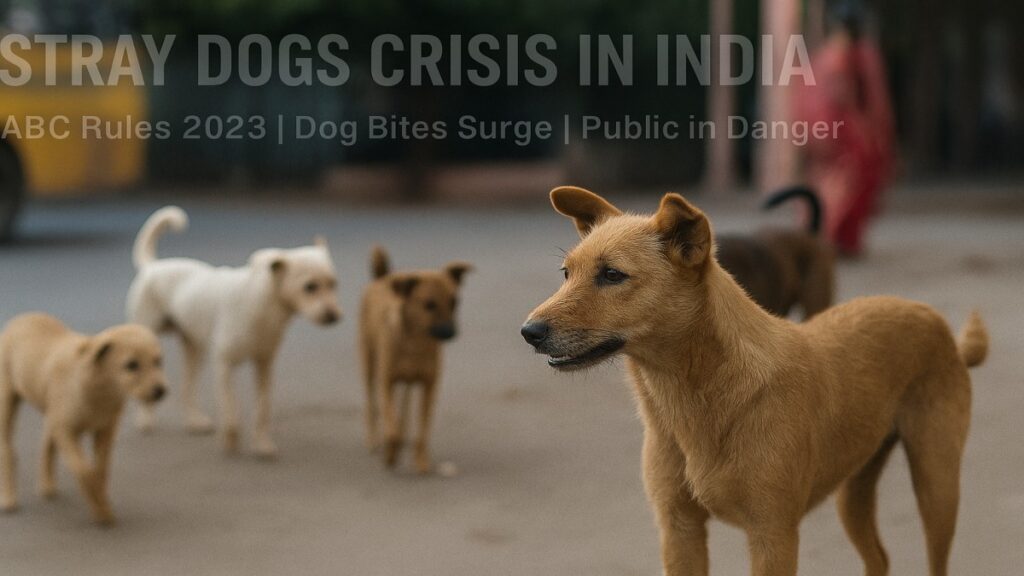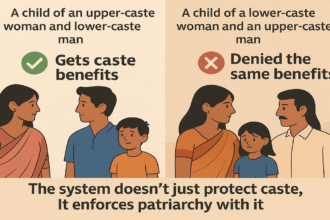
Ahmedabad, 22 July, 2025 – Stray dogs have become a serious and growing menace in urban and rural India alike. From metropolitan cities like Delhi and Bengaluru to tier 2 towns and remote villages, the increasing population of stray dogs is triggering alarm due to frequent attacks, dog bites, and the fear of rabies. Vulnerable groups especially children and elderly citizens are the most impacted. As India grapples with this public health and safety issue, government rules and local interventions are struggling to keep up with the scale of the crisis.
Municipal Duty Under Article 243(W): What the Law Says
As per Article 243(W) of the Indian Constitution, municipalities are mandated to perform functions related to public health, sanitation, and animal control. Controlling the population of stray dogs falls squarely under this responsibility.
Municipal bodies across India are required to implement the Animal Birth Control (ABC) Programme, which includes sterilization and vaccination of stray dogs to manage their numbers humanely and effectively. However, the implementation remains inconsistent and underfunded in many parts of the country.
ABC Rules 2023: A Revised Framework for Action
In a significant step to streamline dog population control, the Central Government notified the Animal Birth Control Rules, 2023, under the Prevention of Cruelty to Animals Act, 1960. These rules, notified on 10th March 2023 via G.S.R. 193(E), supersede the earlier ABC (Dog) Rules of 2001.
Key Provisions of ABC Rules 2023:
- Sterilization and immunization of stray dogs by local authorities.
- Mandatory training of personnel involved in capturing and handling dogs.
- Humane treatment of animals during the entire ABC process.
- Formation of monitoring committees for better implementation at the city level.
- Despite this legal framework, gaps in execution remain a critical issue.
Advisory from DAHD: Implementation Push to States and UTs
On 11th November 2024, the Department of Animal Husbandry and Dairying (DAHD) issued an advisory to all Chief Secretaries and UT Administrators. The advisory emphasized the urgent need to implement the ABC Rules 2023 through local municipal bodies. States and Union Territories were directed to ensure that activities such as sterilization, vaccination, tagging, and record keeping are carried out efficiently.
Still, the success of this effort depends on adequate infrastructure, trained personnel, and public cooperation all of which are sorely lacking in several regions.
MoHFW’s Role: Tackling Human Health Impacts of Dog Bites
While the Department of Animal Husbandry focuses on animal welfare and control, the Ministry of Health and Family Welfare (MoHFW) handles the public health aspect of dog bites and rabies prevention. Rabies, a deadly but preventable disease, remains a concern in India where dog bites account for nearly 97% of human rabies cases, according to WHO.
MoHFW runs national rabies prevention programs and provides post exposure prophylaxis (PEP) at public hospitals. But access to timely treatment, especially in rural areas, is still a major hurdle.
Real Life Incidents: When Stray Dogs Turn Violent
Numerous incidents in recent years have made headlines, reinforcing the urgency of the stray dogs problem.
1. Hyderabad Horror (April 2023): A CCTV video of a 4 year old boy being mauled to death by a pack of stray dogs shocked the nation. The child was alone near his home when attacked.
2. Noida (September 2024): A 65 year old woman sustained severe injuries when she was attacked by a group of stray dogs while taking her morning walk. The incident prompted local RWA protests.
3. Bengaluru (July 2025): In Koramangala, a street vendor was bitten by five dogs while walking back from work. Though he survived, his treatment cost him ₹20,000 an unaffordable amount for many.
4. Lucknow School Panic (June 2025): Parents protested outside a school where three students were bitten in a single week by stray dogs roaming the premises.
These cases are not isolated. Thousands of such attacks go unreported or receive no medical attention.
Children and Elderly: The Most Vulnerable
Children and elderly people are particularly at risk from stray dogs. Small children often lack the awareness to avoid aggressive dogs, and senior citizens cannot run or protect themselves during attacks.
In cities like Mumbai, schoolchildren have been advised to walk in groups. Parents are demanding stricter enforcement and animal control measures in school zones and residential areas.
Rising Public Outcry: Demand for Better Enforcement
Public anger is growing as authorities fail to act swiftly on citizen complaints. Petitions are being filed in High Courts across states demanding sterilization drives, public awareness, and better waste management since food waste is a primary attractant for stray dogs.
In many cities, residents have also clashed over feeding of stray dogs in public places, leading to societal tensions. While animal rights groups defend feeding as a humane act, many residents see it as inviting danger into public spaces.
Judicial Observations: Striking a Balance
Courts have weighed in on the issue, seeking a balance between animal welfare and human safety.
For instance, the Supreme Court of India in several orders has reiterated the importance of implementing the ABC Program properly instead of resorting to culling. However, delays in execution are leading to judicial frustration as well.
Challenges in Implementation
Despite good intentions, the following challenges plague the ABC Programme:
- Lack of funds for sterilization centers.
- Shortage of trained veterinary staff.
- Inefficient municipal coordination between health, animal husbandry, and sanitation departments.
- Public resistance to dog catching in certain areas.
The Way Forward: What Can Be Done?
To effectively address the menace of stray dogs, India needs a multi pronged strategy:
- Strict Enforcement of ABC Rules 2023 across all urban and rural areas.
- Public education campaigns on safe interaction with stray dogs.
- Mandatory reporting of dog bites and online grievance redressal portals.
- Partnerships with NGOs and private veterinary clinics to scale up sterilizations.
- Better waste disposal systems to eliminate food sources for stray dogs.
- Zoning of feeding areas with supervision to reduce public conflict.
Shared Responsibility
The problem of stray dogs in India is no longer a localized nuisance it is a national public safety and health concern. While the legal framework like the ABC Rules 2023 and the advisory from DAHD provides the right direction, effective implementation remains key. It requires political will, administrative efficiency, public cooperation, and judicial support.
Stray dogs deserve humane treatment, but citizens also have a right to safe streets. It’s time for India’s municipalities to rise to the occasion and restore the balance between compassion and accountability.
Stay connected with The News Drill for more updates.















